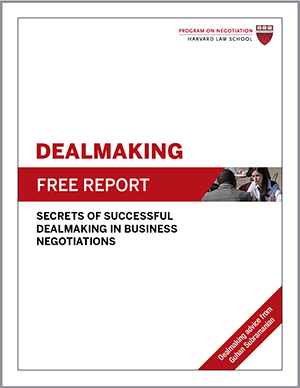
Imagine that a professor shows a jar full of coins to his class and announces he’s auctioning it off. Students are told they can write down a bid and that the highest bidder will win the contents in exchange for the money he or she bid. After everyone has written down their bids, the professor polls the class and finds out that a student named Sarah is the high bidder at $45.
“Congratulations, Sarah, you’ve just won all the coins in the jar!” the professor says.
“How do you feel?”
“Lousy,” says Sarah, before even hearing how much money the jar contains.
Harvard Business School professor Max Bazerman has held this auction many times as a classic illustration of the winner’s curse phenomenon in competitive bidding. The winner’s curse describes a common problem: the party who wins an auction of a commodity of uncertain value with a fair number of bidders typically pays more than the asset is actually worth.
In Bazerman’s coin auction, the winning bidder typically feels embarrassed and disappointed before finding out how much money is in the jar because she realizes that, in all likelihood, no one else in the room estimated the value in the jar to be as high as she did. In the auction described, the jar contained only about $20 in coins—so, yes, Sarah dramatically overpaid at $45.
Auctions pervade our world, from mergers-and-acquisitions deals and procurement auctions to eBay purchases. To avoid becoming the next victim of the winner’s curse in negotiations, auctions, and “negotiauctions” (deals that combine elements of a negotiation and an auction), try out these three negotiation tools and techniques.
1. Determine What Kind of Asset is Being Auctioned.
Before entering an auction for an asset, evaluate whether it is a private-value asset or a common-value asset. A private-value asset offers unique value to different bidders. One bidder for a first edition of a novel may plan to resell it to a book dealer, for example, while another wants it because she is the author’s great-granddaughter. If you are bidding for a purely private-value asset, you need not fear the winner’s curse. You should feel fine about winning an auction for your great-grandfather’s book, as its sentimental value is yours alone.
By contrast, common-value assets, such as an oil lease or a jar of coins, should have equal value to all bidders, even if it’s unclear how profitable it will be. The winner’s curse can be a real risk in such auctions.
Notably, most assets have both common-value and private-value elements. That book might be priceless to you, but someday your family may want to resell it—thereby introducing a common-value element. Rarely can you avoid the risk of the winner’s curse completely, but it will be greatest when you’re bidding for assets with a strong common-value element.
2. Figure out If You Have an “Edge.”
Speaking at Harvard in 2007, the famed dealmaker Bruce Wasserstein, now deceased, had this to say about the winner’s curse: “I think it’s the winner’s dilemma more than a curse: any time you’re the buyer, you wonder why the other [bidders] didn’t want it.”
To overcome this dilemma, advises Wasserstein, assess whether you have a “comparative advantage” over other bidders—unique knowledge, capabilities, or resources. This “edge” often signals the unique private value an asset would have for you.
As an example, in a 2000 auction, Simon & Schuster publisher David Rosenthal paid $8 million for Hillary Clinton’s memoir, outbidding seven other publishers in the hope of selling more than a million copies of the book. “I haven’t heard of the winner’s curse,” Rosenthal said in the New Yorker, “but there’s an old publishing dictum: The only thing worse than not getting a book is getting a book.”
Fortunately for Rosenthal, Living History was a hit. Simon & Schuster’s superior distribution network and marketing capabilities relative to other publishers likely gave Rosenthal confidence that the Clinton book provided unique private value to his firm, thus allowing him to place the high bid while avoiding the winner’s curse.
3. Look Forward and Reason Back.
Before making a bid during an auction, consider how you will feel if it turns out to be the winning bid. As noted, if you are bidding for an asset with a common-value element, that should give you pause. Ask yourself: Would I feel comfortable making this bid if I knew that all other bidders value the asset less than I do? If you answer yes, proceed with your bid. If you answer no, you should shade your bid downward.
Are there other negotiation skills you would recommend to those seeking to avoid the winner’s curse?





Great learning , I think it’s more winners dilemma than a curse because you have to make use of the valueless product to recover some dollars ! Thanks